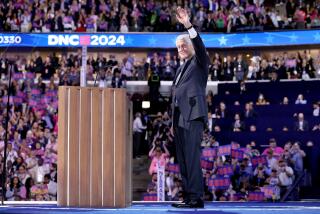Jackson Says He Won’t Run for President
- Share via
WASHINGTON — The Rev. Jesse Jackson said Saturday he will not run for President in 1992, but he vowed to retain a strong voice in selecting the Democratic Party candidate and keeping the national political debate focused on the issues of poverty and equality.
Jackson said that his decision to skip a third run for the Democratic nomination does not mean he will sit on the sidelines. He pledged to register a million new voters and, through a coalition of blacks, labor and the poor, to require candidates to talk about poverty, racial divisions and rebuilding America.
“I stand here today to get the nation’s attention,” Jackson told supporters at a public housing project just a few blocks from the Capitol Building. “I want to continue to put light in dark places, bring heat into cold places and show some human concern where there is now gross indifference.”
Jackson’s absence from the race gives the Democratic candidates new opportunities to compete for his loyalists among blacks and labor. As runner-up for the Democratic nomination in 1988, Jackson got nearly 7 million votes and emerged as the national spokesman for a core constituency of minorities and the dispossessed.
No one can count on those votes, but the most likely beneficiaries among current candidates are Sen. Tom Harkin (D-Iowa), who is running a liberal-populist campaign; Arkansas Gov. Bill Clinton, and Gov. L. Douglas Wilder of Virginia, the only black who has declared his candidacy.
However, the biggest potential winner in Jackson’s decision is probably Gov. Mario M. Cuomo of New York, if he chooses to run. Many Democratic analysts say it is now more likely that Cuomo will enter the race.
Jackson ducked the chance to comment on the members of the Democratic field, saying it was premature. But he cautioned that no one should take for granted the backing of the constituency he has built up over the last decade.
“We are free agents in a political market, and we want the best value and a fair return on our investment,” he said, adding later: “Voters cannot be inherited. They must be earned.”
In outlining his agenda, Jackson warned the Democratic Party to avoid moving to the right and becoming a clone of the Republican Party, which he attacked for ignoring the poor and the disenfranchised.
“For a few in our society, living is a lullaby of unlimited options and dreams,” he said. “But for an ever increasing number of people the noose is tightening, choking off opportunities. These people don’t need conservatism. They need change.”
Jackson, 50, clearly is not done with presidential politics. When asked if he had given up his dream of sitting in the White House, his response drew the biggest cheers of the day from the small crowd of supporters gathered in the courtyard of the Potomac Gardens housing project.
“The fire has not gone out,” he said. “I know that becoming President really is a matter of time. . . . We ran in ’84. We ran in ’88. And now we are coming in for a pit stop to get new tires and to overhaul our motor. We are going to come back out faster and stronger than ever before.”
While saying that he remains a strong Democrat, Jackson said he plans to expand his Rainbow Coalition into what he called a new Democratic majority. Its support, he said, will go to candidates who favor such goals as national health care, women’s rights, increased domestic spending and statehood for the District of Columbia.
The group will organize by state and congressional district and meet with candidates to listen to their solutions to those problems. While Jackson rejected the idea of running as a “favorite son,” he said his organization might field its own slates of delegates for the Democratic convention.
Jackson had been leaning toward not running for several months, according to some of his advisers. He had been cautioned to skip 1992, since a loss in a weak field risked having him labeled as a perennial candidate and chronic loser.
In recent weeks, supporters from black and labor groups had urged Jackson to reconsider because they feared that his absence would mean issues important to them would be ignored in the campaign.
“He has a special responsibility to keep raising those issues and keep speaking for those people,” said Ann F. Lewis, a Democratic consultant in Boston.
More to Read
Get the L.A. Times Politics newsletter
Deeply reported insights into legislation, politics and policy from Sacramento, Washington and beyond. In your inbox three times per week.
You may occasionally receive promotional content from the Los Angeles Times.










